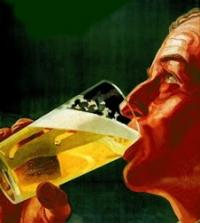
Removing bicarbonate
#1

Posted 19 May 2016 - 02:14 PM
#2

Posted 19 May 2016 - 02:18 PM
Doob, i usually use lactic acid in the mash and sparge. Works well for me.
#3

Posted 19 May 2016 - 02:18 PM
#4

Posted 19 May 2016 - 02:28 PM
Does the acid floc out the bicarbonate?
#5

Posted 19 May 2016 - 02:30 PM
I'm not thinking for pH adjustment, more of a flavor driven question. Bicarbonate kind of adds more harshness to hops, no?
Does the acid floc out the bicarbonate?
chemically changes it to something else.
#6

Posted 19 May 2016 - 03:09 PM
#7

Posted 19 May 2016 - 03:15 PM
Depends on the acid but here's one example:
2HCl + CaCO3 = CaCl2 + CO2 + H2O
That's actually just a wild guess but I'll verify that when I get home after work.
Edit: I was pretty close.
CaCO3(s) + 2H+(aq) → Ca2+(aq) + CO2(g) + H2O (l)
#8

Posted 19 May 2016 - 03:17 PM
Ken or someone, what is the chemical action here? What does the bicarbonate turn into?
homocarbonate...
Seriously though a water softener works by replacing the calcium with sodium or potassium. Probably not the right way to do it since then you high concentrations of other minerals. RO is the way to go if you want a solution that doesn't involve boiling or distillation.
#9

Posted 19 May 2016 - 03:23 PM
I could do RO, but I'm worried about all the brine waste. Nano would have less waste, but if it doesn't work, doesn't matter. The system I am putting together has (up to 3) giant activated carbon filters and an RO system.
#10

Posted 19 May 2016 - 03:28 PM
We have hard water here and most of the breweries just use phosphoric acid to reduce the RA. Pretty good for IPA, not so much for Bo-pils.
#11

Posted 19 May 2016 - 05:25 PM
#12

Posted 19 May 2016 - 07:14 PM
#13

Posted 19 May 2016 - 07:30 PM
we have virtual identical water Ken, I do the same for pale beers, seems to work here tooSo you guys bring up a question that I asked many times but I don't know if anyone had the answer at the time. It was Martin who mentioned that I could "neutralize" bicarbonate with lactic acid and it does seem to work. All of my other water numbers are modest (Ca 34, Mg 12, Na 13, Cl 21, SO4 27, bicarb 138) so BoPils or helles, etc. come out okay. But I remember asking if the bicarb was doing anything else that I should be aware of... creating harshness, futzing with head formation and stability, etc. but I never did hear. Mtn, Brauer or anyone else... if you have a feel for this, please advise. Martin may have an answer for this too. On a pale beer I need about 3ml of lactic acid in my 4.5 gallons of mash water (plus some CaCl and CaSO4) to get my pH into the 5.2 or 5.3 range. It's more like 2ml of acid when the beer is darker. I do occasionally cut the water with distilled (25% is common) for pale beers.
#14

Posted 19 May 2016 - 07:50 PM
So you guys bring up a question that I asked many times but I don't know if anyone had the answer at the time. It was Martin who mentioned that I could "neutralize" bicarbonate with lactic acid and it does seem to work. All of my other water numbers are modest (Ca 34, Mg 12, Na 13, Cl 21, SO4 27, bicarb 138) so BoPils or helles, etc. come out okay. But I remember asking if the bicarb was doing anything else that I should be aware of... creating harshness, futzing with head formation and stability, etc. but I never did hear. Mtn, Brauer or anyone else... if you have a feel for this, please advise. Martin may have an answer for this too. On a pale beer I need about 3ml of lactic acid in my 4.5 gallons of mash water (plus some CaCl and CaSO4) to get my pH into the 5.2 or 5.3 range. It's more like 2ml of acid when the beer is darker. I do occasionally cut the water with distilled (25% is common) for pale beers.
Bicarbonate has no flavor in the beer itself. It contributes to poor flavor if it is not neutralized by acid (via malt or direct acid additions) resulting in a high pH. It's the high pH that results in the harsh hop presentation, husky/grainy flavors and astringency. It is neutralized by acid as show by MTN above and rests in water and CO2 that gasses off.
#15

Posted 19 May 2016 - 07:55 PM
The husky/grainy flavors are a definite and I think you and I both mentioned that happening to us. So the bottom line is that once you "neutralize" it with acid, the bicarbonate is not just a risk to futz with your pH anymore... it's actually GONE. Non-existent. Am I understanding that right? I did ask that question just as Doobah asked it in this thread... does it still impact flavor, smoothness, conflict with hops, etc.Bicarbonate has no flavor in the beer itself. It contributes to poor flavor if it is not neutralized by acid (via malt or direct acid additions) resulting in a high pH. It's the high pH that results in the harsh hop presentation, husky/grainy flavors and astringency. It is neutralized by acid as show by MTN above and rests in water and CO2 that gasses off.
I didn't realize our waters were that similar. I know you like to make the occasional gold beer... do you just use your source water or do you dilute it a bit? I occasionally dilute about 25% to lower sulfate for something like a helles or BoPils.we have virtual identical water Ken, I do the same for pale beers, seems to work here too
#16

Posted 19 May 2016 - 08:00 PM
my sulfate is about 12The husky/grainy flavors are a definite and I think you and I both mentioned that happening to us. So the bottom line is that once you "neutralize" it with acid, the bicarbonate is not just a risk to futz with your pH anymore... it's actually GONE. Non-existent. Am I understanding that right? I did ask that question just as Doobah asked it in this thread... does it still impact flavor, smoothness, conflict with hops, etc.
I didn't realize our waters were that similar. I know you like to make the occasional gold beer... do you just use your source water or do you dilute it a bit? I occasionally dilute about 25% to lower sulfate for something like a helles or BoPils.
Edited by miccullen, 19 May 2016 - 08:03 PM.
#17

Posted 19 May 2016 - 08:06 PM
Chemical engineer by degree here, but pragmatic and thus speaking in very general layman's terms....
Acid (any acid) turns bicarbonate into CO2 and water. Unfortunately, the other half of bicarbonate is all the sodium and calcium which is harder to get rid of. If the water is really hard then dilution is the solution. Phosphoric acid is probably the best to use overall because the phosphates that form are largely insoluable so you can actually get rid of some of the other stuff besides the bicarbonate.
Edited by dmtaylor, 19 May 2016 - 08:08 PM.
#18

Posted 20 May 2016 - 05:40 AM
#19

Posted 20 May 2016 - 06:01 AM
So if I'm reading this right, the best approach would be to use phosphoric pre-filtering of the water?
yeah - if you need to use a lot I think phosphoric can be used in higher amounts than lactic. for a lot of people (like myself) I don't need to use a ton of lactic so I don't think it ever has a flavor impact on my beer.
#20

Posted 20 May 2016 - 06:02 AM
The different acids is in question too (at least with me). I have heard you need more phosphoric because it's weaker. I've also heard that phosphoric doesn't really lend a flavor component which is good. You need less lactic acid but I have heard that you shouldn't use more than 1ml per gallon of water used otherwise you'll go over the flavor threshold and start altering the flavor of the beer (for better or worse... some say that a little lactic acid SNAP is good). I filter first and then add CaCl/CaSO4 and acid before I start heating my strike water. I would agree that if you have a number in your water that is out-of-whack and/or very high compared to everything else, dilution would be the way to go. I have 138ppm of bicarb on my water which I thought was a lot until Martin told me that was a manageable number. Some people have 400+ ppm of bicarb so I envision lots of "water lugging" on brewday.So if I'm reading this right, the best approach would be to use phosphoric pre-filtering of the water?
0 user(s) are reading this topic
0 members, 0 guests, 0 anonymous users













